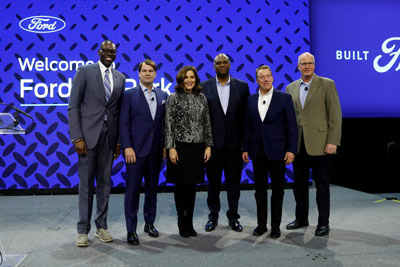Michigan says it needs $750 million more from taxpayers to prep the site for Ford Motor Company's $3.5 billion electric vehicle battery plant in Marshall.
Taxpayers are already footing $1 billion for the factory, dubbed "Project Hickory," that Ford says will create 2,500 jobs.
Economic development officials said "not a cent" of the $750 million would go to Ford, but would instead fund site readiness.
The $750 million includes $330 million to the Michigan Department of Transportation for road improvements, $224 million for pad-ready site improvements, $100 million for water and wastewater improvements and $75 million for land acquisition. Other projected spending includes $15 million for Norfolk Southern rail improvements, $5 million for building inspections and $300,000 to fund fiber optics.
The cost breakdown was included in documents distributed at the Feb. 22 House Appropriations Committee hearing.
Ford said the factory is key to delivering an annual run rate of 600,000 electric vehicles globally by the end of this year and 2 million globally by the end of 2026.
Currently, Michigan has 25,181 EVs registered statewide. Cost is one major barrier to adoption. According to Kelley Blue Book, the average price of an electric car in September 2022 was $65,291. Meanwhile, the average price for a gas-powered vehicle was $48,100. Moreover, many used gas-powered cars cost between $5,000 and $15,000.
Ford's BlueOval factory aims to make lithium iron phosphate batteries in the U.S.
Chris Smith, Ford’s chief government affairs officer, said CATL, a Chinese company, was only a technical service provider for the plant and rejected claims that CATL would receive taxpayer money.
“The government of China has no role in the project and no tax dollars will go to the company licensing that technology,” Smith said.
However, Smith couldn’t provide the contract between Ford and CATL, saying it was still under negotiations.
Rep. Andrew Fink, R-Hillsdale, said Chinese law requires “all Chinese companies to cooperate with the intelligence gathering operations of the Chinese government, which is wholly controlled by the Chinese Communist Party.”
“I think we can’t talk about this seriously by saying, well, they’re not going to be a direct recipient,” Fink said. “What is the real substantive reason that we shouldn’t be concerned about the presence of an entity that is legally subject to the control of the CCP, according to the laws of their own country?”
Rep. Rachel Hood, D-Grand Rapids, said the proposed jobs would only pay between $20-$40 an hour, which is “barely a living wage job” to support a family.
Marshall City Manager Derek Perry supports the plant. He said the project could bring 2,500 jobs to a region that’s lost 2,000 jobs in 20 years. Perry said the Ford investment is “critical” in reversing that trend.
Michigan Economic Development Corporation CEO Quentin Messer Jr. said the project’s goal is to grow Michigan’s population and the tax base.
Smith said Ford plans to recycle EV batteries to extract minerals from used batteries.
"A battery that is at end-of-life still has a lot of value," Smith said.













